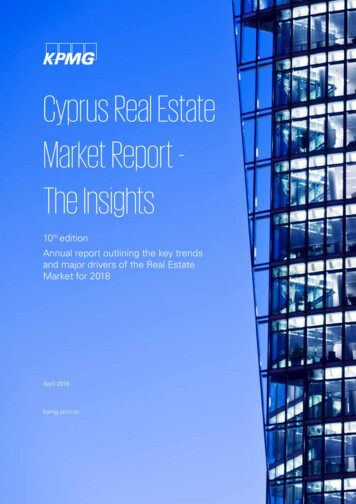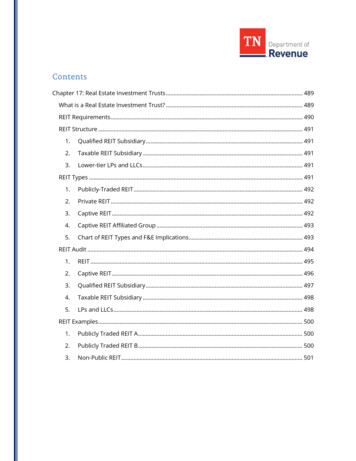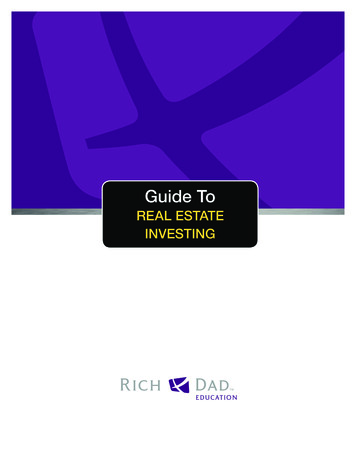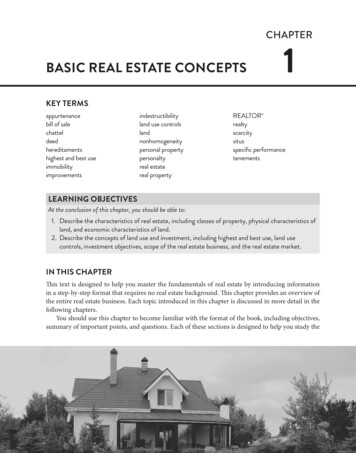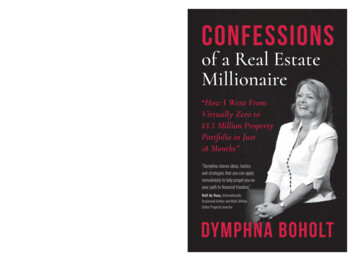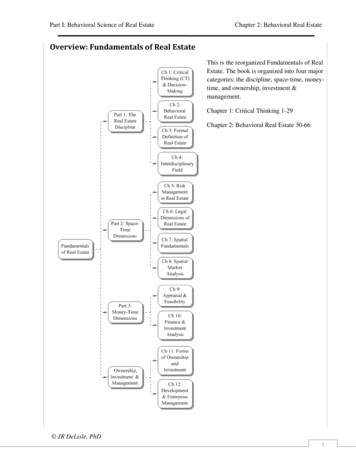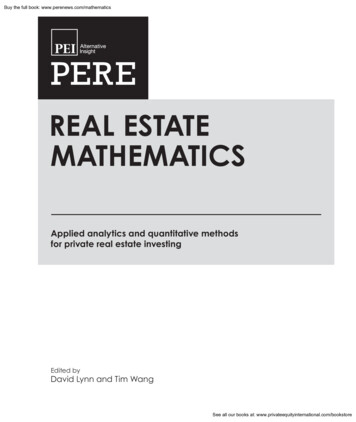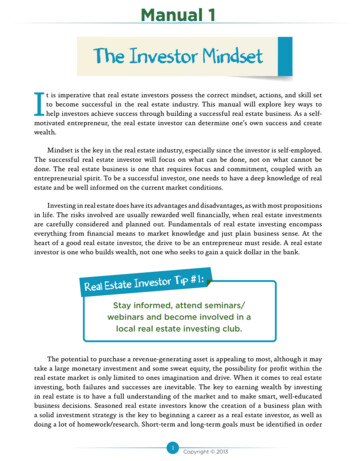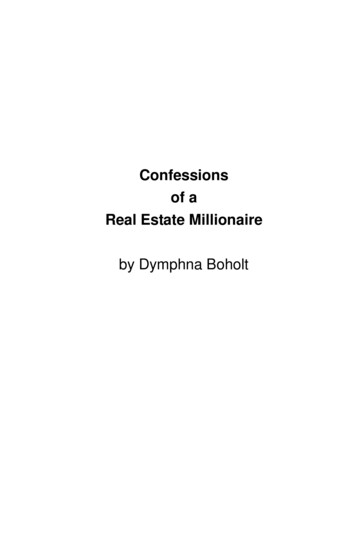
Transcription
Confessionsof aReal Estate Millionaireby Dymphna Boholt
Second Edition 2012Copyright - Dymphna BoholtAll rights reserved. No part of this publication may be reproduced, stored ina retrieval system or transmitted in any form or by any means, electronic,mechanical, photocopying, recording or otherwise, without the expresswritten permission from the publisher.Published by DymphnaBoholt.comPO Box 944, Buderim, Qld 4556Email: admin@dymphnaboholt.comWebsite: www.RealEstateSuccess.com.auProject Coordination by Petra FrieserEditing by Patti Claridge, Karen Nicholas, Erin Jones & Petra FrieserPrinted by Fergies Print & MailNational Library of Australia Cataloguing-in-Publication entryBoholt, Dymphna.Confessions of a real estate millionaire / Dymphna Boholt.ISBN: 9781921225031 (pbk.)Boholt, Dymphna.Women millionaires--Australia--Biography.Real estate investment--Australia.332.6324092
DisclaimerThe information in this book is based on my own personal journey.You should not rely upon any information or example in this book asbeing relevant or applicable to your particular situation. This book isnot meant to provide legal or financial advice and should not berelied on to do so.The opinions stated in this book are Dymphna Boholt’s personalviews and are not intended to be a text on the legal and financialaspects of property investing and should not be relied on as such.Whilst every care has been taken in the preparation of this book thepublisher will not accept any responsibility or liability for any errorhowever caused, whether by negligence or otherwise in theinformation contained in it. Readers are urged to seek appropriateadvice from suitably qualified professionals for their individualneeds. All figures and statistics recorded in the book are accurate atthe time of publishing however may be subject to change.
DedicationEven though my story may sound like I did it all on my own andsometimes it certainly felt that way – no one ever does it all on theirown. I would like to dedicate this book to my husband Brian, mythree beautiful children, friends and all the unmentioned heroes whohelp out other people with what they do, whether it is a service,some advice or just a smile, everything helps.
ForewordIn the last decade there has been an explosion of self-help books bypreviously unheard-of authors. Many of these authors are motivatednot by a deep-seated desire to share the results of their decades ofresearch and study, but rather by a deep-seated desire to generatecash for themselves. Authors are using ever-catchier titles ( in thegenre of “become a millionaire by lunchtime”) and using the rapidlyfalling costs of eBook distribution to gain a foothold. Then, by gettinga few followers to conspire to buy their book on Amazon at aparticular hour on a particular day, they manage to achieve, for thathour, best-seller status (the qualifying list bestowing that title isusually omitted) and for the rest of their lives attach a by-line to theirname of “international bestselling author”.Dymphna Boholt is not one of those authors.When I first met Dymphna, two things struck me about her. Firstly,she is passionate about what she does. While for most people,accounting is as dry a subject as you could imagine, Dymphnamanages to infect her audiences and readers with an enthusiasmthat is contagious and beneficial. She by no means preaches thatanyone should become an accountant. However, with interestingexamples and liberal use of creativity, she shows that a modicum ofunderstanding of the rules of accounting can pay handsomedividends. So, since we all have to account for what we dofinancially, you may as well make it fun and lucrative.The second thing that struck me about Dymphna is that at her core,she is neither an accountant nor a financial planner, but rather adeal-maker. She has that rare talent and even rarer lateral-thinkingmind that entrepreneurs and deal-makers seem to share, namelythe ability to bring together a seemingly disparate set of people,assets, circumstances, opportunities, capital, debt and technology,
to achieve the ultimate alchemy: create something out of,seemingly, nothing.During our phone calls, when she might be in one place that fewpeople have ever been to, and I in another that few people haveever heard of, we will discuss anything from the valuable waterrights of a farm whose core farming operation alone would otherwisemake it worthless, to the merits of investing in a zeolite-miningoperation, and from the returns on apartments in the United Statesto falling cap rates in the fastest growing city on this planet.Dymphna teaches not because she needs the money, but becauseshe is passionate about getting her message out so that others maylearn in a few hours what she has spent decades learning the hardway – through experience. They say that experience is the bestteacher, but it does not have to be your own experience! I do notneed to experience cocaine to decide whether it is something I wantto do long-term. By reading Dymphna’s book, you gain theexperience of what she has been through, without putting anythingat risk.There is also the saying that ‘knowledge is power’. Well, I disagreevehemently! Knowledge of itself is totally useless. So what if youknow more than anyone else on this planet about the mating habitsof moths in Ethiopia? Knowledge is only of any use if you can applyit. Applied knowledge is power! The great thing about Dymphna’sbook is that it is not a collection of random musings that aresomewhat entertaining but otherwise useless. Rather, Dymphnashares insights, ideas, tactics, strategies and shortcuts, from a vastwell of experience, all dished up with tremendous and genuineenthusiasm, that you can apply immediately, to help propel you onyour path to financial freedom.
Dr Dolf de Roos - Author of the New York Times bestseller RealEstate Riches
IntroductionI am more of a speaker than a writer when it comes tocommunication – all my life I have found it easier to pick up thephone to contact friends, family and business associates rather thanwrite a letter. I will however, do my very best to make this book ajourney.A journey that will hopefully inspire, a journey that willmotivate and above all, a journey that will educate.I remember starting very early on in my life as an educator – I nowrealise this began years before I ever walked out on stage.Itstarted when I was talking one on one to clients as an accountantsome 20 years ago. However things really started to take on awhole new dimension when a man I greatly respect and admire andnow consider a mentor and a friend, Dr Dolf De Roos, said “Whenyou are privileged with the talent of knowledge and the ability topass it on – it is your duty to do so”. I consider the public speakingthat I do and the courses that I run, and now the publishing of thisbook, a way of giving back to the industry that has provided me withsuccess.A lot of sports people will understand this feeling and the almostcompelling duty I feel. It is the reason many formerly successfulsports players stay active local and club sports players in theirchosen sports long after their playing careers are over, by coaching,managing, administrating or being involved in some other way in asport that has given them so much joy over the years.The real estate industry is not unlike a game too. A game thatrequires much strategy, team building, persistence and discipline.Provided you put into practice all you’ve learned and keep learningfrom both your wins and your losses, success will come, and when itdoes, it is for life.
Author’s NoteThis book has been written in a duality style. You will start with myinvestment life story, taking you back to when things really started tochange for me.I will take you through all the stages of myinvestment life and how each step added to my wealth both incharacter and in dollars.Every second chapter is an analysis or critique of that phase of mystory, which you will note is written in a different style font from therest of the text. This in-depth look at what I did, what I should orcould have done differently will hopefully provide you the reader witha sound set of tools, both economic and emotional, to better equipyou for your own financial success story.My story is not anuncommon one when you start to enquire about other people’sfinancial success and the reasons and strategies behind theirsuccess.Everyone will have their own idea of what success, and in particularfinancial success, means to them. For some it will mean becominga millionaire, for others it will mean having enough money to retireand maintain their current standard of living and for others it willmean increasing their standard of living and their lifestyledramatically.For me, it meant replacing the income which I was working 40 – 60hours a week to earn in my accounting practice with passive incomethat comes in regardless of what I chose to do with my time. Itmeant being able to spend time with my kids while they were stillyoung and not time with my grandkids in 20 to 30 years time. As asingle Mum, time was what was most important,and it was money,in particular, passive income, that was going to give me thatfreedom.I hope my story may inspire you to achieve the same.
Chapter 1Such is the life of a single mumThe sun was just starting to set over the hills in the crimson sky.Slowly it was fading from a vibrant red and orange to a muted pinkand blue. It was like this most afternoons along the Queenslandcoast, but I wasn’t on the beach or the deck enjoying the view, witha drink in my hand. Once again I found myself sitting in the officealone, surrounded by files which I should have been working on tofinish a client’s job before they came in the next day As I sat there, daydreaming out the window, I realised that I hadcome a long way from the insecure divorcee who had moved to thebeautiful Sunshine Coast just a few years prior with a baby in armsand heavily pregnant with my second child. I had made the 40,000I got in a divorce settlement go a long way. I now owned a quainttwo-bedroom fibro cottage in a good position in the hills whichshadowed the coastline, half an office, and half an accountancypractice which, although it was still a fledgling business, wasshowing good promise and produced sufficient income to makeends meet for myself and the kids.Yes, I had much to be proud of, and much to be grateful for. Yet stillI found myself dissatisfied, sitting in my office, with piles of clients’files covering the floor around my desk, watching the clock to makesure I didn't miss the 6.30pm deadline to pick up my two childrenfrom day care.I simply couldn't afford the dollar a minute theycharged if you were late picking them up. I had been caught withthat before. My mood was definitely melancholy, not exactly a “Woeis me” attitude, but more a “What am I doing here?”, “Where am Iheading?” kind of attitude.
I looked around my office, and although the furnishings were basic,they were quite comfortable and professional. My fingers absentmindedly played with the leather armrests of my 800 chair that Ihad so proudly purchased after my first six months of trading. Myrationale for buying such an expensive item was that I intended to sitin the chair for probably the next 15 years, so it might as well be agood comfy chair.On this particular day however, that samethought was daunting, and scared me to the core.How couldanyone want to sit in the same chair, in the same office, doing thesame thing for 15 years. Okay, so some people do, but I knew rightthen at that moment, I certainly didn’t.I had always been a restless spirit. As a child, I was like the freerange animals on my parents’ farms. I didn’t like to be caged up. Iliked to wander about and discover new beautiful things in my world.My family were all a little nomadic too. None of my brothers andsisters fitted the “stay in the family home forever” mould either.Somewhere in the lead up to, and the hurt of the divorce I hadchanged. Only two years before when I was fresh out of the divorce,I felt the need for security and routine, and knowing what the nextday held. Now though, I was restless and had outgrown the cocoonof absolute security and normality I had initially craved. I was gettingback to my true personality. I was again becoming the person I hadbeen as a child and young adult before the later part of my maritalexperience messed up my emotions!It had taken me several long, hard years to regain my selfassurance, my self-confidence and get back to being me, theindividual, not me, the person who had to consider, and in fact bowdown to the opinions and actions of another person. Even though Iwould consider myself a strong person, and I certainly didn't endureany physical abuse like so many other women (in fact like somefriends of mine were exposed to, as their marriages disintegrated), Istill felt at some deep level an insecurity that my marriage had failed
because somehow I wasn't a good enough wife to keep themarriage alive.Years of mental manipulation and snide, insinuating comments hadcertainly made some pretty big dents in what I had thought, as aconfident teenager/young adult/newly-wed, was an amour-platedself-esteem. Clearly I was wrong.I believe a lot of this feeling of failure came as a result of my strictCatholic upbringing where no one is supposed to get divorced. Noone in my family had ever been divorced. In fact, at the time I wasgoing through the emotional rollercoaster of a failing marriage, Ididn’t even know any friends or work associates who had beenthrough a divorce or could offer any real life experiences as support.Of course it’s a very different story these days. I know I am in theclear majority, where over half the population has been divorced.Not that these statistics are at all comforting.“You made your bed, you lie in it.” I heard my mother’s wordsechoing in my head.“Oh! He’s only a man, you have to makeallowances,” said my aunt who had been married to only one mansince she was a teenager. The trouble was, my bed got a littlecrowded with a long list of other women (girls), over the years and Iwas feeling claustrophobic!I finally realised no matter how much one half of a marriage tries, itcannot make a marriage.Towards the end, my marriage hadbecome a game of cards, where I simply didn’t want to lose thegame. I hated losing. I had always been very competitive and verysuccessful at sports, academically at school, and in my professionallife. I then found myself in a marriage game I had little control overand could not win. My life at that time was a “soap opera” and Ineeded to turn the television off!
Looking back now I realise at that stage, I was only just starting toget back to the person I really am. It had taken two years. Since thedivorce, my life had been a whirlwind of hard work, juggling theestablishment of my accountancy practice and children's needs,sicknesses and runny noses.My thoughts were abruptly jarred back to the present when afamiliar voice boomed from a doorway. “Are you still here? You’dbetter get a wriggle on, it’s 25 past six and don’t you have to pick upthose two gremlins by 6.30pm?” Ted the surveyor from next doorenquired with a beaming smile on his face.“Oh shit, thanks Ted! Yes, I’d better fly,” I replied in a fluster.Then my other life began for the day. Clock out of one job, clock into another.I quickly shut up the office, leaving my nine o'clockappointment file strewn over my desk, wondering what excuse Icould give as to why their accounts were not completely finished,and bolting down to the car so I could make it to the day care centreby 6.30pm. “Such is the life of a single mum” I thought to myself.With my three-year-old Justin and my two-year-old Samantha safelybundled into the car along with clothes, nappies, lunch boxes andsleeping sheets, I tried hard to listen intently to them chat awayabout their days. Both children were full of energy and eager to talkabout every detail of their day and show me countless drawings andpaintings on paper and various items of construction from cardboardand egg cartons. Like most children, they both talked as fast as theycould, at the same time, and at top pitch, without thought that theirtired and frazzled mother was having trouble taking it all in.Having grown up in the country where shopping took place onceevery two months, I had always known how to cook a meal fromvery little, which was a life saver as a single Mum with limited funds.
I was always able to throw together a meal from a tin of tuna and leftover veggies from the day before. Long ago I had learnt to alwayscook more than was needed in the veggie department so they couldjust be reinvented the next day.More kiddies talk, a play on the carpet, baths and a bed time storymeant my day of responsibility was nearly over.It’s certainly a lot easier being an accountant than a mother – butbeing a mother is far more rewarding.As I ran a hot bath – this time for myself - my thoughts drifted backto big picture stuff again – me, and what I really wanted from my life.If I continued doing what I was doing – without being a psychic ofany kind, I could pretty well predict what my life would hold in thefuture. I would continue to cope with the double life I led of ‘incontrol, professional accountant’ by day, and ‘out of control motherof two’ by night and weekends.My business would continue to grow from client referrals due to theactive marketing campaign I had instituted of scheduling a timeevery week to get out and talk to business owners in their workplaces. I would introduce myself and my growing business to them,and offer my accountancy practice services to them. This was acampaign I found to be highly successful, yet one which myprofessional colleagues found highly amusing and very out ofcharacter for an accountant – not the done thing at all in what wasstill a very stiff profession.I would continue to advise clients on what they should be doing withtheir future, their business, their retirement planning, how to protecttheir assets, save money on their taxes and basically run their lives– yet I had absolutely no idea what I should be doing with my ownlife. I could continue to sit in my 800 chair for the next 15 years. I
would continue to contribute to superannuation – maybe build upenough equity to buy an investment property – maybe somewherewhere I might like to retire.The idea and the picture I was painting was depressing as I laythere in that bath, and it made me feel like I was drowning in myown reality. How was I ever going to make any significant changefor myself and my family if I continued on the path I was on?The question shot pangs of hurt through my chest as I thought of thetwo little beings asleep in the next room – so innocent and so totallydependent on whatever decisions I made. No longer was it justabout me – if I made the wrong decisions I would be totally stuffingup their lives as well! A familiar feeling of fear started to creep inand I recognised that it was at this point in my thought patternswhere I usually decided this line of thought was too hard and I wouldwash it away with a glass of wine, or by watching mindless rubbishon TV.But that night was somehow different, I felt enough pain to want tobreak through the seemingly endless circle my life was in. What didI need to do differently? What did I need to change? What did Ireally want anyway? What significant difference could I make in mylife that would make me a better Mum? What hurt the most, wasfeeling like I was being a lousy Mum.For some time, through sheer necessity (or so I thought), I hadworked from 7.30 in the morning to 6.30 at night and brought fileshome from work on most weekends. This meant that I was usuallytoo tired and cranky to be the happy, light hearted, spontaneousMum I wanted to be. I was simply too tired and focused on trying tomake ends meet.
Those past two years had been hard beyond belief, and never againdo I want to stand at the grocery store counter in trepidation as Ihand over my credit card – not knowing whether it is going to acceptthe transaction or not. Cold shivers run down your spine as you waitto see if you have to make up an excuse as to why funds haven’tcleared or whether you breathe a sigh of relief that you haveescaped for another week.That night I sat up for hours, alone and thinking.Thinking andwriting down all the things I wanted in my life. How I wanted myperfect day to take place. How I wanted to be and act with mychildren. All the things I wanted to have as part of my life bothfinancially and emotionally.I broke these burning desires intocategories – financial, lifestyle, family, emotional, social, communal(who I was in my community and what I could contribute), spiritualand of course the all important, fun factor - the fun that I wanted inmy life and my kids’ lives.I let my pen have free reign.To do this, I first had to let myanalytical mind blow out the window and forget the barriers of what Iconsidered possible and what I considered fanciful or just dreaming.The experience was exhilarating and uplifting. I felt I had a newlease on life and a second burst of energy on a night when I ’sresponsibilities.Once again I fell asleep on the couch, only this time the TV was noton and my unconscious mind continued to ponder the thoughts ofmy future, and what it could be, as I slept.
Chapter 27 Undercover emotions that can change yourfinancial destinyIt is a painful realisation to look at your life and suddenly see that itis not at all how you had expected it to be. It is not necessarily whatyou planned, at least not consciously, but the way life has steereditself through a complicated maze of events. It is at times like thisthat you have to remember, it was you who was at the steeringwheel. You created the life you have now. Even more painful is theanxiety that accompanies the notion that this might be it; this is howit is always going to be.At this point, the most important thing to realise is that this is nothow it needs to be, and know that now is the time to change, andthat only you have the ability to make it change.TriggersA ‘trigger’ is an emotional reaction, the underlying motivation thatcauses one to react or to take stock or re-evaluate their life orsituation. There are many things that can ‘trigger’ the will to change;it might be that you are unhappy in a relationship or in yourworkplace, perhaps there is great financial difficulty or even healthissues. Sometimes the trigger can be quite insignificant; you maybe sitting at the traffic lights and then decide that you never want tosit in traffic at peak hour again, or it can be something life-changingin itself; divorce, bankruptcy or a serious health scare. Whicheverway, it is usually at the point where you are at your lowest.For me, it was somewhere in between, after a period of prolongedcoping with the after effects of divorce, being a single parent andhaving to cope financially.The trigger was that moment of
realisation ‘the same chair, in the same office, doing the same thingfor 15 years’. 15 years sitting in the same chair, 15 years of rushingout of the office racing to pick up my children in time, 15 years ofexhaustion, feeling caged up and not knowing what the next dayheld. What a terrifying thought! Terrifying enough to jolt me intowanting to change my life right there and then.There is a degree of soul searching involved with locating yourpersonal trigger. You need to define what your personal trigger is.What is it that makes you feel anxious or stressed or unhappy? Youthen need to define why it makes you feel this way. What is theunderlying reason? Financial security or lack of it? Loneliness?Lack of ambition? You’re just not doing anything that you want todo?Finding the trigger is one thing, having the courage to pull it is quiteanother!FearFear is a very painful thing and is one of the most difficult obstaclesto overcome. It is the fear of failure, the fear of experiencing morepain and as ridiculous as it may sound, even the fear of success;fear rules our lives. Fear is an emotional response with a complexrush of accompanying sensations ranging from dread and anxiety,to feelings of worthlessness and inadequacy and it can impact ourlives dramatically. It is fear that is usually the underlying factor thatcauses most people to never go that one step further, to follow thatdream, or in some instances, even dare to dream in the first place.We develop a thousand reasons that back up the fear; it will neverwork, good things never happen to me, I am unlucky, I amunworthy Counteracting fear is the hardest thing to face when exploring thepossibility of changing your life. Just like everyone else, I had my
own set of fears. I feared making the wrong decision and theconsequences that it would have on my children. I feared being alousy Mum. I feared not being in control. I feared ever having to relyon another person, but fortunately my greatest fear of all was thatthings were never going to change, and that fear became the triggerto combat all other fears and work towards change.When times get tough and you start to doubt yourself, your abilitiesand the process, you need to have something to hold onto. Youneed to incorporate a strategy or a process or a vision to keep youfocused and on track. Some people keep a journal, some peopletell the whole world what they are doing so they can’t turn back orthey would lose face (this is a little bit like me, or I create situationswhere I have no alternative but to proceed). Some people stick it onthe fridge – whichever way you choose, you need a fear bustertechnique, Something that puts you back fair and square on thereason you are making the change; something that keeps youfocused and on task.Coping mechanismsWhen we go through periods of your life that involve great change(for example in my case, a divorce), we develop coping mechanismsto help us through.Our emotions get buried somewhere in thedistant past and we just get on with the task at hand, earning moneyand caring for our children. we are in pure survival mode.When you are in survival mode, there is no time for dreaming orlooking to the future. you are just living from day to day and doinganything to numb the pain. I spent years doing this. I worked frommorning to night, or into the night, raced to pick up my children fromschool or day care, made dinner and paid the bills (only just). Wedo what we have to, to survive, to cope with the pain of what wehave experienced or continue to experience, and we are amazingly
resilient beings, but there comes a point in time when we start torecover, and where security and survival were in previously enough,now they are suddenly not.Making decisionsYou have defined in your life what it is that you don’t like, so now itis time to make that milestone decision – what is it that you do wantin your life, and what are you going to do about it? Are you going totry to change your life or not? This is where the journey truly begins.If you choose not to change your life, well, then, that is exactly whathappens, nothing changes, all will remain the same. Don’t try tojustify or excuse yourself for making that decision – recognise it isyour decision and own it. If you don’t make that decision, then don’twhinge about how your life sucks if you are not prepared to makethe decisions necessary to change it.If you decide, that you do want to change your life, well, this is thegreatest step of all.It is that moment in time where you areoverruling your fear and self-reservation and making a consciousdecision to implement change.How does it feel? I remember that great feeling of elation that I feltat that moment, knowing that this was not how life was going to befrom now on and knowing that I was going to have time to spendwith my children and that I was going to be able to do all of thethings that I wanted to do. I still wasn’t sure how I was going to do it,but I knew that my life was going to change for the better because Ihad made the decision to make it change and I was 100%committed to the process.The difference between committing 100% to something, knowing,really knowing with every part of your being, that you are going tomake this happen, is very different from thinking about something
and deciding that, “Wouldn't it be nice if my life was this way orthat?”. It's like those people who make a New Year's resolutionevery New Year's Eve to lose weight or get fit, when really they havenot committed to what it really takes to lose weight or get fit, or ifthey have, they haven't put into place the necessary supportmechanisms to keep them on track, to stay focused, and to actuallymake that change happen.For these people, perhaps the end goal wasn't big enough, ormaybe the pain of the current situation wasn't enough.This isexactly why I am a big believer in continued education and supportmechanisms. People who go to weight loss centres such as WeightWatchers, Jenny Craig etc. or join a gym and actually go on aregular basis, generally have more success than those who try to goalone.Similarly, when it comes to your finances and enrollingyourself in continued education courses, participating in activefinancial groups and forums, reading books, or listening to tapes allhelp to keep you on track. At the end of the day though, actionneeds to be taken if you want the decision-making process toactually last and result in the changes you want to see in your life.Combating negative thought and self-doubtNegative thought patterns and self-doubt set in almost immediatelyonce a decision is made to implement change, and can often bringany promise of change to a grinding halt there and then until thenext time we pluck up enough courage to try again and again andagain.Combating self-doubt and negative thought is difficult but importa
Confessions of a real estate millionaire / Dymphna Boholt. ISBN: 9781921225031 (pbk.) Boholt, Dymphna. Women millionaires--Australia--Biography. Real estate investment--Australia. . I would like to dedicate this book to my husband Brian, my three beautiful children, friends and all the u
